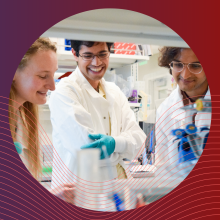Our postdoctoral scholars program provides research support and a community of mentors and peers to extraordinary Stanford postdocs advancing our understanding of the mind and brain in health and disease.
Our postdoctoral scholars program provides research support and a community of mentors and peers to extraordinary Stanford postdocs advancing our understanding of the mind and brain in health and disease. Our postdoctoral scholars program provides research support and a community of mentors and peers to extraordinary Stanford postdocs advancing our understanding of the mind and brain in health and disease.
Interdisciplinary Postdoctoral Scholar Award
Since 2015, the Interdisciplinary Postdoctoral Scholars program has supported innovative young researchers who engage in highly interdisciplinary research in the neurosciences, broadly defined. Our postdoctoral scholars have backgrounds in basic and clinical neurosciences, biomedical sciences, physical sciences, social sciences, engineering, education, law, business and humanities, and are all engaged in cutting edge research that will advance our understanding of the mind, brain and behavior in health and disease.
Brain Resilience Postdoctoral Scholar Award of the Knight Initiative
The Brain Resilience Postdoctoral Scholars award of the Knight Initiative for Brain Resilience generate paradigm shifting insights on the mechanisms of neurodegeneration and/or how to maintain brain resilience into old age.
Application Components
Our next postdoc applications will open in Winter Quarter 2024.
This program is open to current Stanford postdocs.
Our Model
This program awards two years of fellowship funding and is pleased to provide parental leave. Postdoctoral scholars also receive $5,000 of discretionary research funds annually.
Mentorship
The program provides scientific and career-growth opportunities and guidance under the leadership of program co-directors and faculty mentors Professors Miriam Goodman and Liqun Luo. Scholars meet monthly with their cohort and program faculty mentors to share ideas and discuss approaches to scientific and career challenges, visit each other’s labs to learn about different research techniques and areas of study, and practice communicating their research to scientific and general audiences.
In addition, Brain Resilience Postdoctoral Scholars attend events and seminars hosted by the Knight Initiative for Brain Resilience, and are stewarded by Knight Initiative Associate Director Natasha Hussain and faculty mentor Elizabeth Mormino to learn from one another and build community around the topic of neurodegeneration and brain resilience.
Diversity
The Wu Tsai Neurosciences Institute Postdoctoral program brings together cohorts of postdocs representing the broad range of demographic, experiential and scientific diversity. Women and postdocs from groups underrepresented in the neurosciences are strongly encouraged to apply.
| Key Dates for 2024 POSTDOCTORAL Scholar Awards | |
|---|---|
| Application Opens | Friday, August 11, 2023 |
| Application Deadline | Sunday, September 24, 2023, at 5:00pm PST Including faculty sponsor statement(s) and recommendation letters |
| Notification of Awards | Late November, 2023 |
| Award Start Date | Funding may begin between February 1, 2024 and June 1, 2024 |
Funding Period | Two years of funding from start date |
| To Apply | Apply here |
Funded Interdisciplinary Postdoctoral Scholar projects
Investigation of synapse formation by novel nanoscale imaging techniques
Synaptic junctions linking individual neurons constitute the fundamental building blocks of our brain. Understanding their inner working is crucial to unravel the mechanisms by which our brain processes information. However, imaging structures at a relevant sub-synaptic level is challenging and has often hampered advances in neuroscience.
Forces driving myelin wrapping In oligodendrocytes
Dr. Miguel Garcia believes that identifying the mechanism of myelin wrapping is important in understanding neural development and is a critical first step towards creating much needed therapeutic approaches to stimulate remyelination in patients with demyelinating diseases.
Next-generation brain imaging in freely moving animals
Calcium imaging in freely behaving animals allows for the tracking of neuronal activity under approximately normal behavioral conditions. However, the slow response time of calcium imaging inhibits high resolution voltage and temporal measurements. To address this issue, modern molecular tools have been developed to optically report the high-speed dynamics of neurons more accurately.
The role of non-canonical GABA synthesis in midbrain dopamine neurons on striatal inhibition
Due to the critical role that dopamine producing neurons play in pathophysiology, it is important to examine the function of its co-released GABA. This research aims to study GABA biosynthesis in midbrain dopamine producing neurons and it’s effect on striatal inhibition.


